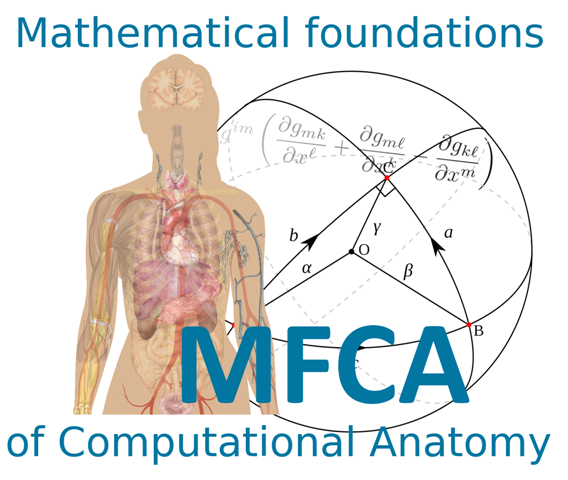
6th MICCAI workshop on
Mathematical Foundations
of Computational Anatomy

|
MFCA 2017 6th MICCAI workshop on Mathematical Foundations of Computational Anatomy |
|
|
MFCA is a MICCAI workshop devoted to statistical and geometrical methods for modeling the variability of biological shapes. The goal is to foster the interactions between the mathematical community around shapes and the MICCAI community around computational anatomy applications. The workshop aims at being a forum for the exchange of the theoretical ideas and a source of inspiration for new methodological developments in computational anatomy.
Following the
RationaleThe goal of computational anatomy is to analyze and to statistically model the anatomy of organs in different subjects. Computational anatomic methods are generally based on the extraction of anatomical features or manifolds which are then statistically analyzed, often through a non-linear registration. There are nowadays a growing number of methods that can faithfully deal with the underlying biomechanical behavior of intra-subject deformations. However, it is more difficult to relate the anatomies of different subjects. In the absence of any justified physical model, diffeomorphisms provide the most general mathematical framework that enforce topological consistency. However, working with this infinite dimensional space raises some deep computational and mathematical problems, in particular for doing statistics. Likewise, modeling the variability of surfaces leads to rely on shape spaces that are much more complex than for curves. To cope with these, different methodological and computational frameworks have been proposed (e.g. smooth left-invariant metrics, focus on well-behaved subspaces of diffeomorphisms, modeling surfaces using currents, etc.) The goal of the workshop is to foster interactions between researchers investigating the combination of geometry and statistics in non-linear image and surface registration in the context of computational anatomy from different points of view. A special emphasis will be put on theoretical developments, applications and results being welcomed as illustrations.Workshop format and topicsThe program will be composed of oral presentations selected by the peer-reviewed contributions of the participants. To foster interactions, a large amount of time will be reserved for discussions after each presentation. Contributions are solicited in (but not limited to) the areas of:
Key Dates
Paper submissionAuthors are invited to submit papers of about 10 to 12 pages in the LNCS format on the MFCA'15 CMT submission portal https://cmt3.research.microsoft.com/MFCA2017 before the submission deadline. The file format for submissions is Adobe Portable Document Format (PDF). Other formats will not be accepted. Please create an account on your first login on the CMT system. Papers accepted at the MICCAI conference cannot be submitted. Notice that the workshop submission deadline will be after the MICCAI decision. Double submissions are NOT allowed with any other MICCAI workshop. If you hesitate between several workshops, please contact the workshop chairs beforehand.Program08:00 - 10:00: Session 1: Diffeomorphisms and algorithms for Computational Anatomy
10:00 - 10:30: Coffee break.10:30 - 12:30: Session 2: Keynote and longitudinal computational anatomy
12:30 - 13:45: Lunch.13:45 - 15:30: Session 3: landmark and curves
15:30 - 16:00: Coffee break.16:00 - 17:30: Session 4: Shape analysis using Varifolds
ProceedingsProceedings are now published and onlin at https://doi.org/10.1007/978-3-319-67675-3. Proceedings from previous MFCA workshops are available at http://hal.inria.fr/MFCA/.RegistrationFollow the instructions at the official Miccai 2017 website to register for this workshop.Organizers
Program Committee (confirmed participation only)
|